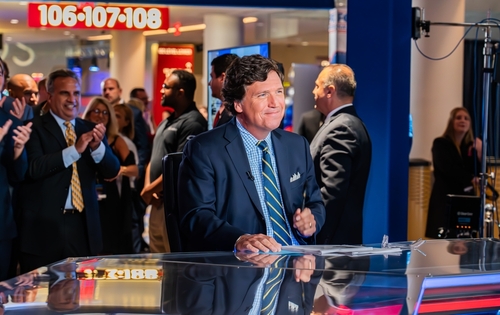
In a recent fiery critique that has set the internet ablaze, Tucker Carlson delivered a scathing commentary on Canadian Prime Minister Justin Trudeau. The conservative commentator did not hold back as he suggested that Trudeau might consider returning to Cuba, a statement that has sparked both controversy and amusement among audiences.
The jab at Trudeau’s heritage stems from long-standing rumors regarding his familial ties to the former Cuban dictator, Fidel Castro. These rumors are fueled by the historical friendship between Trudeau’s parents and Castro, coupled with a perceived physical resemblance between Trudeau and the late Cuban leader. While these claims have never been substantiated, they have become fodder for political commentators like Carlson.
Tucker Carlson calls Justin Trudeau to state Canada will be Liberated.
Let’s pray this happens because all Major Canadian Political Parties are Captured and Corrupt to the core. pic.twitter.com/1lLccScISx
— Liz Churchill (@liz_churchill10) January 23, 2024
Carlson’s remarks extended beyond Trudeau’s ancestry, targeting the Prime Minister’s understanding of cultural practices. He criticized Trudeau for his past actions, such as dressing up as Aladdin at an “Arabian Nights-themed” party in 2001, suggesting that while Trudeau may don the costumes of other cultures, he lacks a genuine comprehension of them.
The commentary reached a peak when Carlson humorously proposed that if he ever met Trudeau, he would demand an immediate DNA test using a service like 23andMe. This quip played into the narrative of questioning Trudeau’s lineage and underscored the satirical tone of Carlson’s critique.
Tucker Carlson just accused Justin Trudeau of being a closeted homosexual
Do you agree with him?pic.twitter.com/iIX0CsUAOF
— The Pleb 🇨🇦 Reporter (@truckdriverpleb) January 25, 2024
The conservative pundit’s words resonated with many who view Trudeau’s leadership style and policies as problematic. To them, Carlson’s statements highlight what they perceive as Trudeau’s performative and superficial approach to governance and cultural sensitivity.
Carlson’s call to “liberate Canada” was made ahead of his visit to Calgary, Alberta, where he left a voicemail for Trudeau’s media line declaring his intentions.
This bold move was emblematic of the confrontational style that has become synonymous with Carlson’s brand of commentary.
As the dust settles on what some have called the roast of the year, it is clear that the exchange has struck a chord with those critical of Trudeau’s administration. Whether one views Carlson’s comments as a mere jest or a pointed political critique, they have undoubtedly added fuel to the fire of an ongoing debate about cultural identity, heritage, and the responsibilities of public figures in representing and respecting diverse backgrounds.










